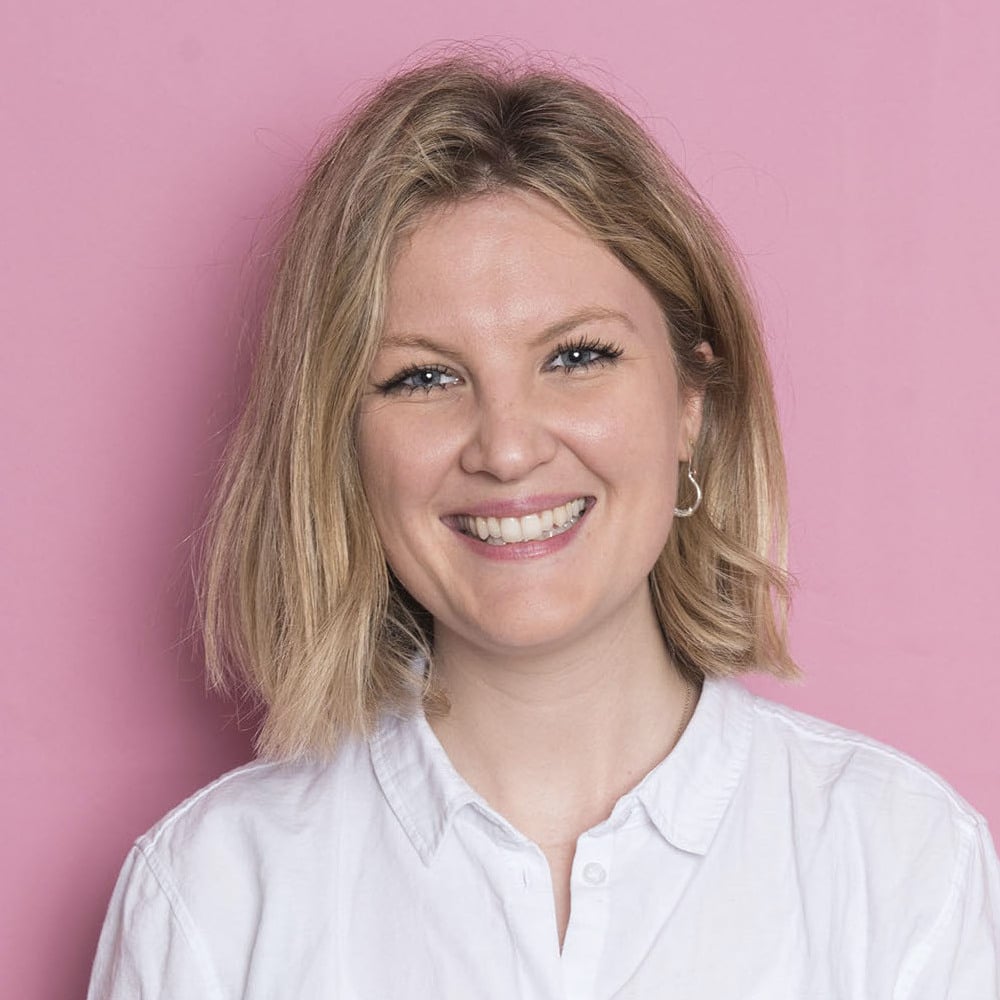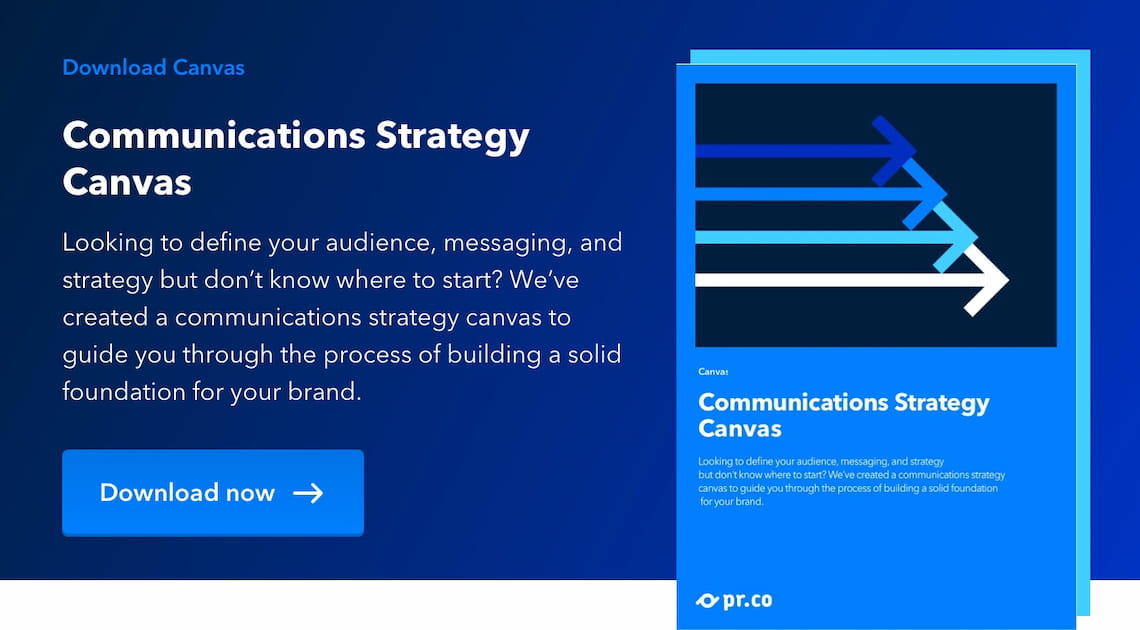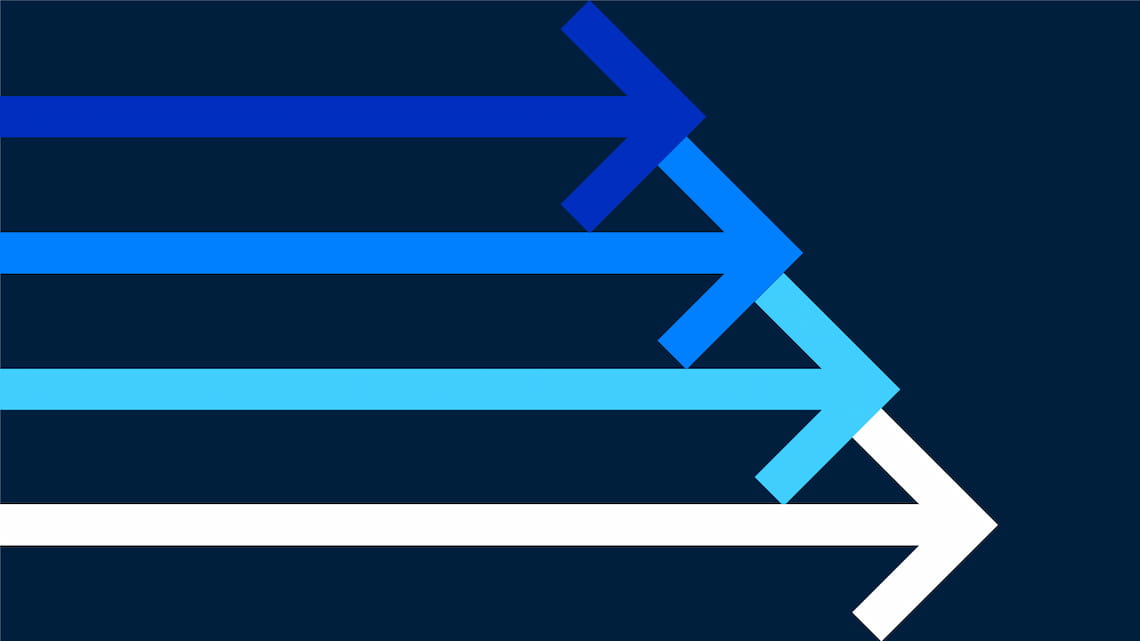When Emily Hinks co-founded her business Mischief Makers, she found that corporate communicators sometimes took themselves a little too seriously. Here she explains how they shake things up in order to boost creativity.
.jpg?width=736&name=360014-Mischief%203-1fb573-original-1595590784%20(1).jpg)
Tell us about yourself
When I was young I took part in the National Youth Theatre. There I worked in a lot of devised productions where you create with big groups of people; with directors and stimulus. Everyone always says if there's anything else you can bear doing other than theatre, do that instead. Being an actress can be pretty unforgiving. So then I thought, okay, maybe there is something else I can do with these skills.
Theatre was very creative, many of the skills you develop through the theatre, like tenacity and commitment are aligned with being an entrepreneur. My interest in creativity took me into advertising for a little while, and then into Hyper Island; a creative business school focused on experience-based learning. They bring in a client, students, and an industry expert, to work together to answer a brief. It's a really great program.
That’s where I realized that a lot of the workshops creatives were doing were similar to those in the National Youth Theatre. And that's where facilitation came into play. I launched Hyper Island in the Netherlands and worked at a few other places before starting Mischief.
When you say mischief, what exactly do you mean?
I think there's a Dutch word for it called ondeugend. We see it as troublemaking; doing things a little bit differently, poking at or shaking things up. Waking people out of a norm, through this cheeky, playful approach, to get different results out of them.
What are the methods you use to create mischief now?
At the core of it, facilitation is why we exist. Our main method for bringing mischief is having a facilitator enter teams, projects, or programs, to help companies and schools navigate the new world of work. Companies finally recognize how powerful and important collaboration and creative confidence are. Those things don't just happen if you throw people into a room together. There's so much to learn about human dynamics; how people work and interact together. We really believe that without collaboration, work can be quite frustrating or difficult. Our perspective is that seriously awesome results don't require serious behavior. You shouldn't hate work, you should enjoy it and be engaged, so you can do your best work.
All of the methods we use help people do exactly that: be more engaged in their work, more effective in their collaboration, and enjoy the stuff they're making and doing. There are many different types of exercises we can use to do that. Some we've come up with ourselves, some that have been around forever, some are from theatre, and some are from business.
In training programs or larger group projects, we focus on how you can create a sense of psychological safety. Because without it, your work just won't be as good or you're not going to collaborate effectively. We also do things like energizers in our sessions when we know we need the energy to be high or focused, or we need a group to break the ice and bond together.

We have things like hot starts which is playful activity connected to the work that's about to be done. It helps people become more comfortable with looking stupid. If you're playing a game, your desire to win overrides your inhibitions. And if you have lowered your inhibitions and look stupid in front of one another in a game context, you're more likely to feel comfortable saying something stupid or asking a silly question, or coming up with a weird idea.
There's also science behind the fact that if you play a game just for five minutes with a stranger, then you bond with them enough that your brain recognizes them as a friend. So you have less cortisol and stress and you feel more connected.
Can you feel more bonded to a colleague too, after five minutes of playing a game?
Yes. In the animal kingdom, when young animals fight with one another, they mimic getting caught or attacking. So that when that actually happens, their body will be more familiar with it, and they'll have less stress. The same goes when you play a game together; you argue or you have this power struggle. Throughout the game, you're practicing communication, so then when you work, you've got more of an established relationship together.
There's also a weird consistency with divorce rates. They noticed they are lower with couples who don't have a dishwasher. One proposed rationale around this is that couples without a dishwasher get into regular small arguments about the dishes, and get used to the language. So when they have bigger arguments, they've practiced arguing and can navigate them better.
The most important thing is that we debrief after these activities. We ask questions like: ‘How did you communicate? Who stepped up as a leader? Who held back? What would you do differently next time?’ And it greatly improves a group's dynamic.
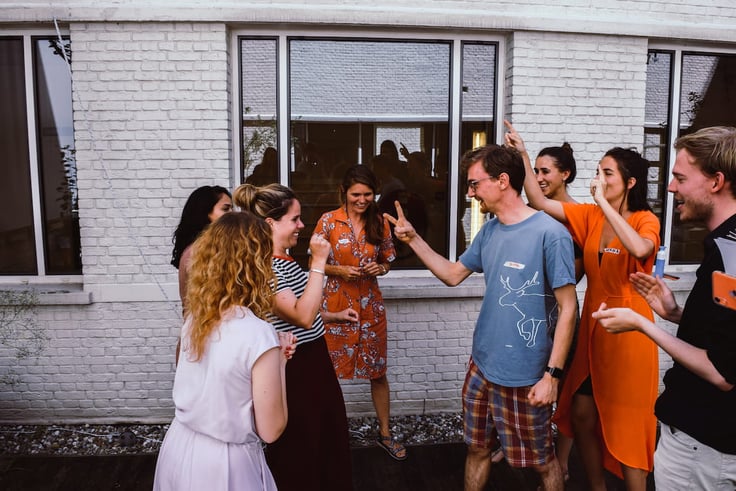
Not everything is happy and having fun all the time. At work there are also intense, sad, or difficult times. But the ability to still enjoy things together is really important.
We always say at the beginning of our workshops or sessions ‘Don't hire us if you want familiar processes with familiar results. We are going to be asking you to do things that feel weird, like silly games, but they're always there for a purpose, to help us learn or achieve something. We've played with bankers, CEOs, and most recently, the UAE government. It can be a lovely experience working with more 'formal' or conservative organizations, or groups of professionals. Once you see suited consultants, or government officials playing 'buzzy bee' you realize we're all people, who like to have a laugh and be human. These moments immediately improve the interactions in the room.
Have you ever facilitated a work environment so formal that people couldn't quite let go?
No, they just let go at a different point. We know that with certain audiences we have to explain the psychological/sociological models and theory behind the sessions upfront. You also have to have some quick wins for groups like that. So you do smaller exercises or activities that really pay off. Then they can recognize the difference between that and the way they were doing it before.
When you've established that trust, and they believe it because they've seen it, it's easier to continue.
For example, we were working in Tallinn, Estonia, we laid out the rules for the sessions up front. We have a tennis ball analogy: the energy you put in is the energy you get out.
In Estonia, they told us part of their culture is the Estonian silence, so for example you’ll say ‘ Is everyone happy?’ and you get silence back. Asking for a response or getting a volunteer is really hard because they're not always used to or comfortable with stepping forward. Having worked with them for a couple of sessions we learned that, so we now say up front ‘we recognize Estonian silence is a thing, but if you don’t get stuck in, you won’t get much out of this session.’ It’s about meeting people where they are, so it’s easier to bring them the rest of it. We’ve never had people refuse to do that.
We have worked with some new regions before where there were new things to learn. The UAE, for example, was much easier than we anticipated. I thought it was going to be harder, because of the cultural differences.
Of course, there are things you have to think about. For example, you shouldn't touch a man, and there are certain things you shouldn't talk about as much. But other than that they were completely cool with everything. At the heart of it, people are people, everyone has their family or friends that they're used to being more vulnerable with. So once you establish a human connection in workshops, people fall into tasks quite easily.
Kio Stark is a thought leader in experience-based learning and education. She says that every participant deserves to know why they are there and to have the opportunity to engage with and enjoy learning. As little kids, we love learning and participating. That gets broken out of us in the system. But if you can do that, then it just works.
If humans learn so well through play, why do we phase it out during adulthood?
Sir Ken Robinson's got a great TED talk on how schools kill creativity. I think it was a necessity of the Industrial Revolution when we had to systematize everything. Schools had to be tested to show that everyone was progressing to meet the demands of society. I think people get into teaching because they want to engage a group of people, but in that context it’s impossible. They have limited space or time to think about how to make the lesson or exercise engaging because they've got to get all those kids to pass the exam.
I think we as a collective lose engagement because the system makes us sit in chairs and passively listen. Lectures have proven to be like the most ineffective way to learn. We only created this format because we used to pass on information with slabs of stone. So you would go listen to one man with a slab of stone and take that information back rather than carrying it with you, because it was too heavy. There's a ridiculous stat that something 10% of people learn by sitting and listening, then walk away with all the information.
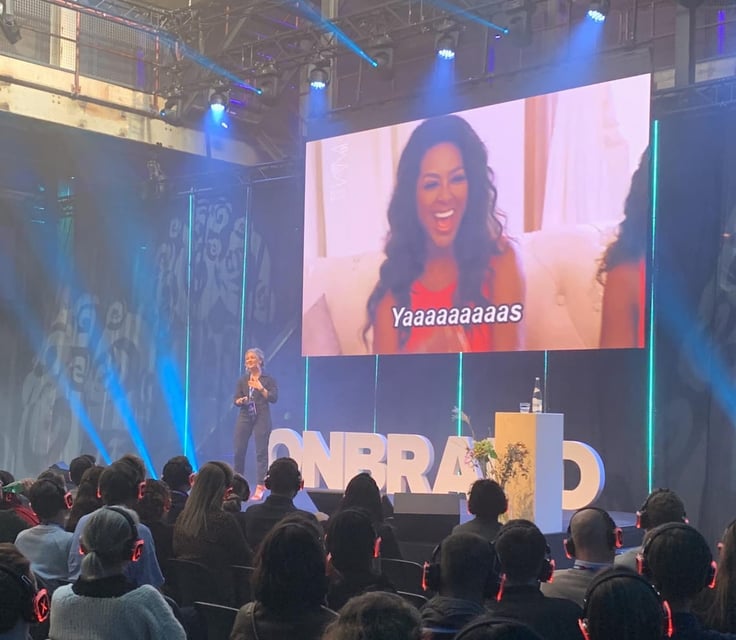
Would you say that brands are reflected in internal culture?
Absolutely. And there are so many ways to introduce a more interactive way of working. For example, we work with Micheal Page, which is a big recruitment firm. They have assessment days for young talent which can be horrible for all parties involved. The young talent is stressed about getting hired and for those interviewing it can be a really long day. Everyone wants to find the right fit. So if you can transform the day into something enjoyable, interactive, that involves everyone; even the people that don't end up getting a job will walk away with the feeling of having gained something from that day.
That’s just a small version of internal processes in corporate culture. I am working with Accenture now, doing a facilitation training programme so that they can work with their clients to make things more interactive and engaging. Because when their clients are happy and more engaged, they get better results. Bigger companies are picking up on this more, as they can quantify the impact of bringing in facilitators.
I think smaller companies and startups will benefit the most from having this as a foundational skill. Being able to lead team sessions or team activities well is something our generation is more likely to pick up. Big companies need to plug that into their processes and systems, which can take longer.
There are simple things that can help, like an anagram to start-up meetings, or tools and techniques to use when people are getting disengaged. And they help with other issues like how to deal with people who are cynical. Or how to cut people off when the discussion has gone on too long.
Why do you think that people learn so well in a group?
Because the collective is smarter than the individual. If you think about it, the best ideas in the world came about when people from different backgrounds and perspectives came together for a challenge.
Work benefits from different perspectives. There's a model called the ‘four ways of knowing’ which is about the way I might solve a problem. I might be more intuitive or more strategic. If I'm trying to solve that problem, I'm only ever going to be able to think of it from my way of knowing. I can try and get at it a different way, but I have an internal bias. Whereas if I talked that problem through with you, you could highlight something that I hadn't considered.
It's a minefield as well when people work as a group. There might be people not pulling their weight, or stuff that’s really diluted because everyone's compromised. You know, too many cooks in the kitchen.
So we talk about the what and the how. It takes a good relationship between the two to get something done. There's the ‘what’, which is the actual work that people are doing. And the ‘how’, which people should spend just as much time answering. For example: How do we talk to one another? How do we deal with conflict? How do we make decisions? How are we distributing the work? Things like that.
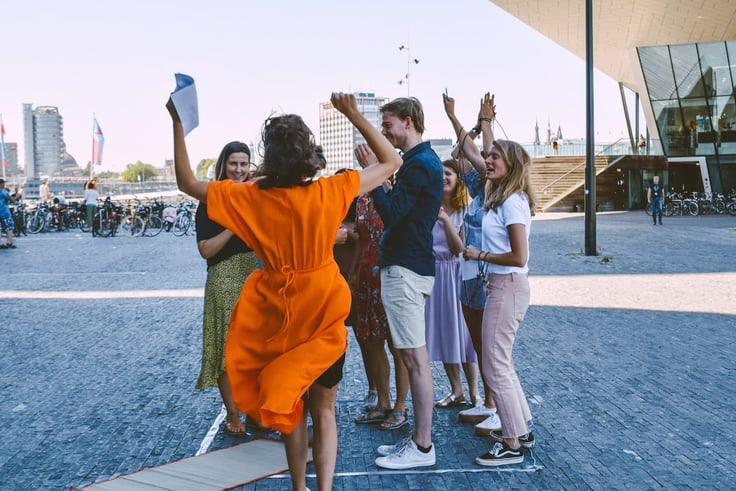
This must be especially important in diverse workplaces
We have a foundation, on the side of Mischief Makers. It's called Routes In. And it's focused on helping young people from diverse backgrounds enter the creative fields, so we match them with mentors. And we mean diversity in every sense; so lower socioeconomic background, different cultures, race, different areas of study, gender.
How do you get your foot in the door if you've not got contacts? The whole job from our side is helping them meet and establish a relationship where they're actually able to support one another, learn from one another, and work together. The biggest battle is this: to get those different perspectives to work together, how do you bring down the barriers or biases that are just so deeply ingrained in us?
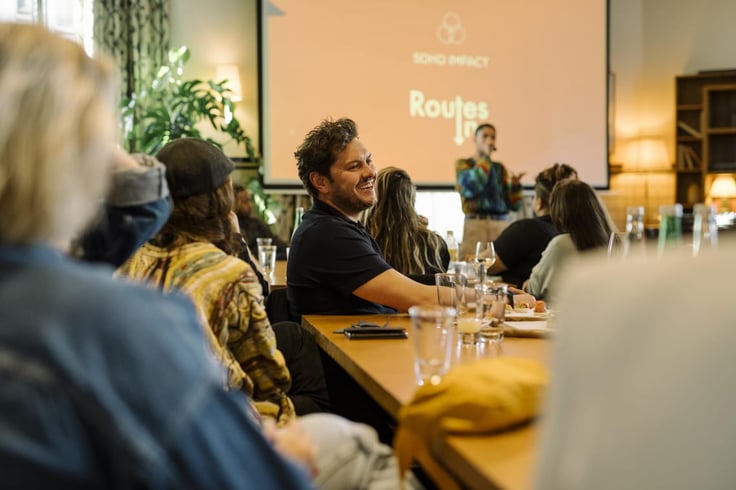
Angelo, one of the guys who coaches the mentors, points out so many things that you just wouldn't know unless someone draws your attention to it. Like when it comes to giving someone a promotion. If there is a diverse team, you have to keep in mind the different realities people might face. For example, different cultures have different commitments, priorities, family time, or things they enjoy doing. Which means they might not be able to, or want to, join Friday night drinks. So when it comes to giving someone a promotion, a manager will say ‘I just click better with so and so’ because unknowingly, they will have spent more time together. So they give the person who goes to Friday drinks the promotion.
There’s a real problem with inclusion. We think we've solved it once the workplace starts to look more diverse. But actually, integration is still not yet being addressed in some cases. And again, not to say that play solves everything, but finding out what activities you can do inside teams and workplaces, rather than just socializing outside of office hours, can really help form some of those bonds or connections.
In those settings, barriers come down, and then you are able to connect more. In our team days, we do things to create a psychologically safe environment, so people can share more of their personal selves. We all have personal, private, and social selves. What remains private has a different line for everybody. But the personal and professional separation in the new world of work is really starting to diffuse. And we need to address how we're navigating that and see the benefits and the downsides.
Like for example, WhatsApp being another workplace now can be a downside. But there are benefits like learning to listen with greater empathy and communicate more effectively. How do we create chances for people to share more about themselves?
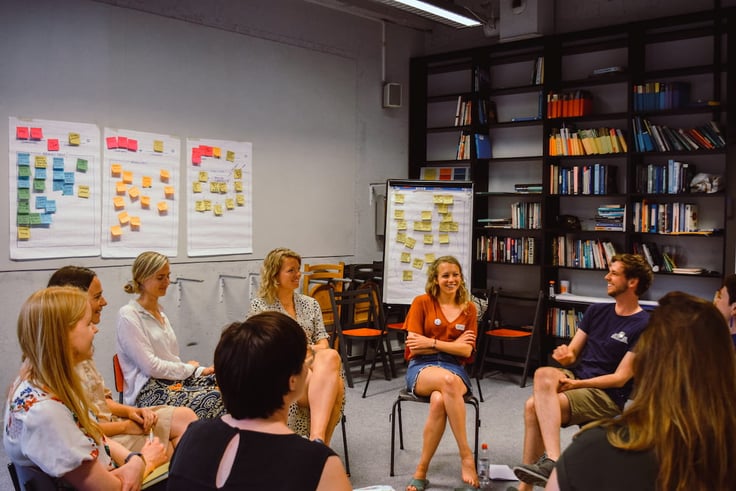
What are the most heartwarming moments in the workshops that you've done?
There are many. I think the times that I feel most proud is when we are doing the facilitation course and you see the mentees start taking the lead and running their own show. The whole thing about Mischief facilitation training is that you’re there with them really close at the start. Then you step back as they step up.
Of course, they can ask us for tools or techniques, but it's about empowering people to reach their full potential. At the end of the program mentees showcase their work and they talk about the journey that they've had or what they've been doing. It gives me goosebumps. For me, when I see my students out there doing a conference or running a workshop… that's the warmest moment.
But inside workshops, the warm moments happen when people are really vulnerable, they open up, or they have a bit of a breakthrough. When they have always done things in a certain way, but they try something different, and it really works for them. That’s why we need reflection sessions because sometimes they’ll go through an activity or project together that was super tense. They want to go home or they have an unproductive fight. We step in and ask what’s going on, which can go on for a couple of hours sometimes. But you can see a physical relief in everybody once it's over and the quality of the work afterward is so much better. Everyone works with more ease. They're tough moments, but really rewarding at the same time.
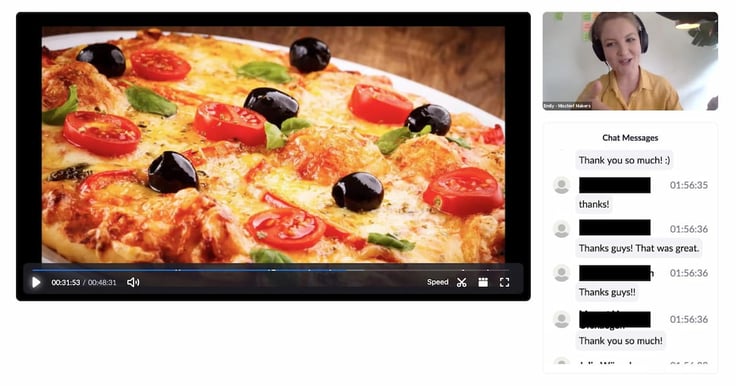
You’ve been doing more online facilitation in light of COVID, how is it different?
Luckily for us, we've been running online workshops for nearly five years so we had a headstart with what's possible online. I co-designed and headed Hyper Islands 'Creating Innovation' online course. To be honest I was skeptical at first, about Facilitating online. As you can probably tell, I love the energy and connection you get working in a room full of people. So I was very happy to find you can absolutely still create that sense of atmosphere and connection that you can 'offline'.
When COVID hit, with our online experience in our pocket we geared straight into action, figuring out how we could share this knowledge as widely as possible to support people coping with the sudden switch to remote working. We ran many free Live Sessions around 'Hosting Online Meetings' and led a 3-part Open Training, alongside trainings for companies like 72 & Sunny, Accenture and World Bank. Between March - June we trained 1000+ people in how to host engaging meetings, workshops and events online. As well as Facilitating sessions ourselves, including virtual showcases for our mentees & mentors in NYC Toronto and Amsterdam. It has certainly been a hell of a ride, this corona-coaster!
We're now supporting our clients and network through the next stage, with our Leading Groups Course. This is about how to confidently and comfortably engage a group whether it's in person, online - or a mix of the two. How to host these 'hybrid' team set-ups is the next big challenge. People often think facilitation is all about standing in front of a group, but there's so much work before and after that makes the group really be able to shine on the day. With hybrid, that will heavily include how to set up the room, with the right tech - how to choose exercises which can involve and engage people remotely collaborating with people in office. Which tools and programs to use to support this. How to keep the culture and vibe alive in a room that's half virtual - half in person. I promise it can be done, and there are so many perks (less jet lag, pollution, and inclusivity to name but a few)! Once you start to nail it, it can be so much fun - and it makes all the difference. No more zoom fatigue and clunky communication. But it takes practice and investing some energy into those facilitation skills.
Emily Hinks is Founder & CEO of facilitation agency, Mischief Makers, who bring energy and enjoyment to working and learning. In 2018 she also founded Routes In, a mentorship program for the creative industry. Emily has more than 10 years of experience in the industry and she transforms meetings, workshops, programs and conferences into engaging, interactive and meaningful experiences.. Connect on LinkedIn or send an email



